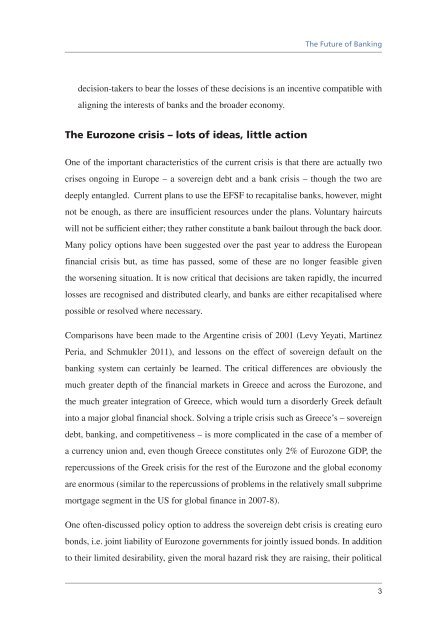Create successful ePaper yourself
Turn your PDF publications into a flip-book with our unique Google optimized e-Paper software.
The Future of Banking<br />
decision-takers to bear the losses of these decisions is an incentive compatible with<br />
aligning the interests of banks and the broader economy.<br />
The Eurozone crisis – lots of ideas, little action<br />
One of the important characteristics of the current crisis is that there are actually two<br />
crises ongoing in Europe – a sovereign debt and a bank crisis – though the two are<br />
deeply entangled. Current plans to use the EFSF to recapitalise banks, however, might<br />
not be enough, as there are insufficient resources under the plans. Voluntary haircuts<br />
will not be sufficient either; they rather constitute a bank bailout through the back door.<br />
Many policy options have been suggested over the past year to address the European<br />
financial crisis but, as time has passed, some of these are no longer feasible given<br />
the worsening situation. It is now critical that decisions are taken rapidly, the incurred<br />
losses are recognised and distributed clearly, and banks are either recapitalised where<br />
possible or resolved where necessary.<br />
Comparisons have been made to the Argentine crisis of 2001 (Levy Yeyati, Martinez<br />
Peria, and Schmukler 2011), and lessons on the effect of sovereign default on the<br />
banking system can certainly be learned. The critical differences are obviously the<br />
much greater depth of the financial markets in Greece and across the Eurozone, and<br />
the much greater integration of Greece, which would turn a disorderly Greek default<br />
into a major global financial shock. Solving a triple crisis such as Greece’s – sovereign<br />
debt, banking, and competitiveness – is more complicated in the case of a member of<br />
a currency union and, even though Greece constitutes only 2% of Eurozone GDP, the<br />
repercussions of the Greek crisis for the rest of the Eurozone and the global economy<br />
are enormous (similar to the repercussions of problems in the relatively small subprime<br />
mortgage segment in the US for global finance in 2007-8).<br />
One often-discussed policy option to address the sovereign debt crisis is creating euro<br />
bonds, i.e. joint liability of Eurozone governments for jointly issued bonds. In addition<br />
to their limited desirability, given the moral hazard risk they are raising, their political<br />
3














